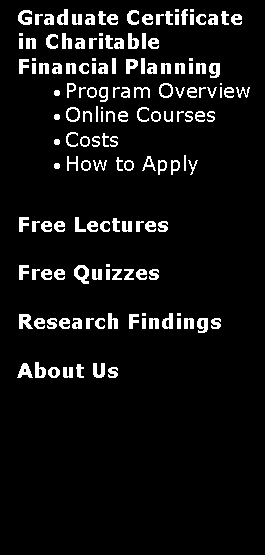|
PFP 5327 Charitable Giving: Research and Marketing
Description This course reviews research findings and theoretical models of charitable giving from the academic literature, and then applies them to the practical realities of marketing charitable giving and planned giving opportunities. Students will review and discuss academic journal articles from fields such as economics, sociology, psychology, marketing, neuroscience, history, public administration, and personal financial planning. The course will focus on determinants and motivations in charitable giving with a continuing emphasis on applying these findings in a professional context for financial advisors and fundraising professionals.
Syllabus
Course Outline
REVIEW OF RESEARCH METHODS AND FINDINGS Cross-Sectional Surveys Methodological Advantages and Limitations Survey of Related Findings Longitudinal Surveys Methodological Advantages and Limitations Survey of Related Findings Laboratory Experiments Methodological Advantages and Limitations Survey of Related Findings Field Experiments Methodological Advantages and Limitations Survey of Related Findings
THEORETICAL MODELS Overview Value from the Act of Receiving Economic Altruism Interdependent Utility Public Goods Provision & Game Theory Value from the Act of Giving: Andreoni’s “Warm Glow” The Role of Self-Efficacy The Role of Self-Identity Value from Others Responses to Giving Direct Reciprocity (Recipient to Donor) Indirect Reciprocity/Social Exchange (Others to Donor) Influencing Cultural Norms (Others to Others) Alternative Perspectives from Other Disciplines The Catalyst: Theory and the Fundraiser Assembling the Gift Opportunity The Role of Response Observation The Role of Request Definitiveness Applying theory to practice Examples for Fundraisers Examples for Financial Planners
|







